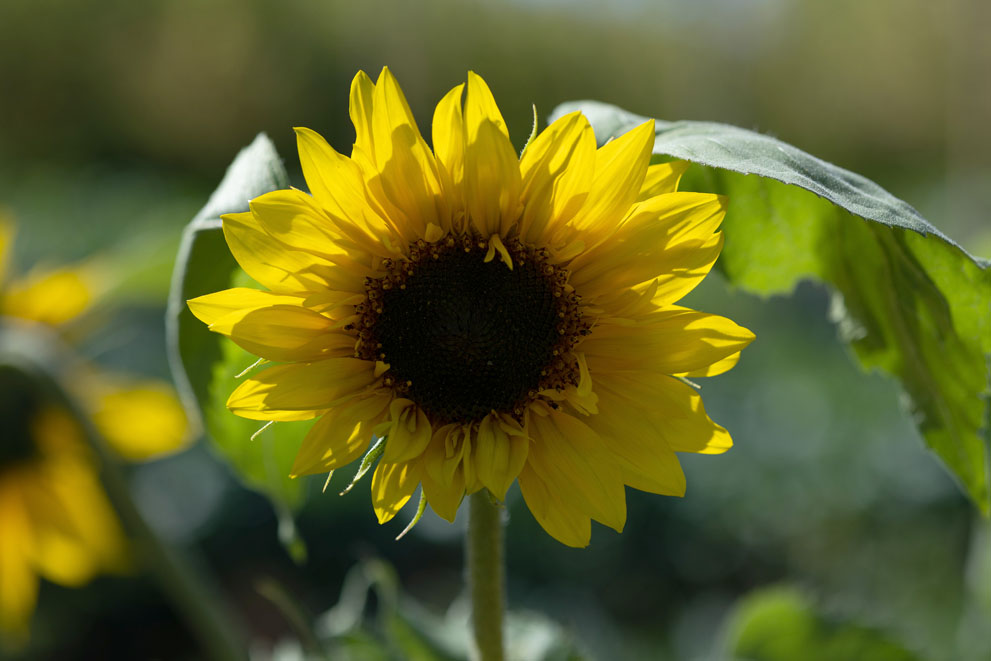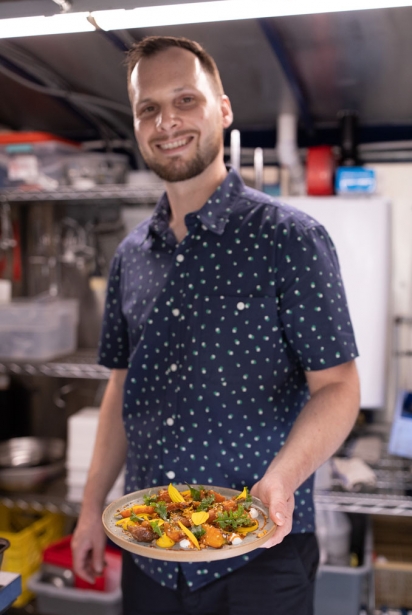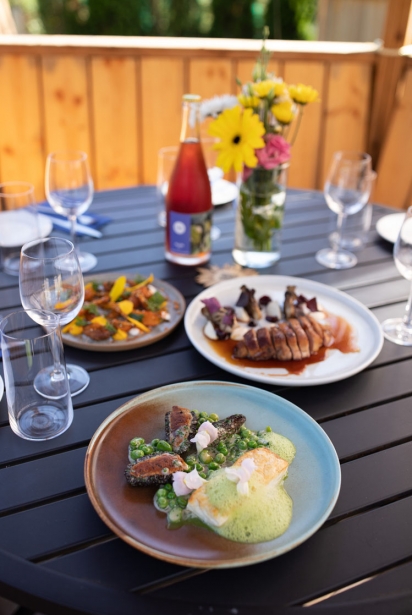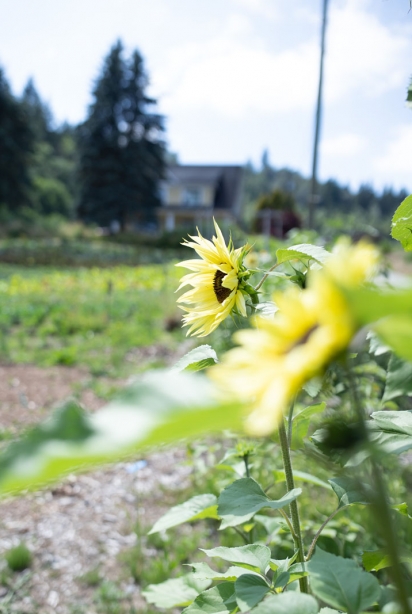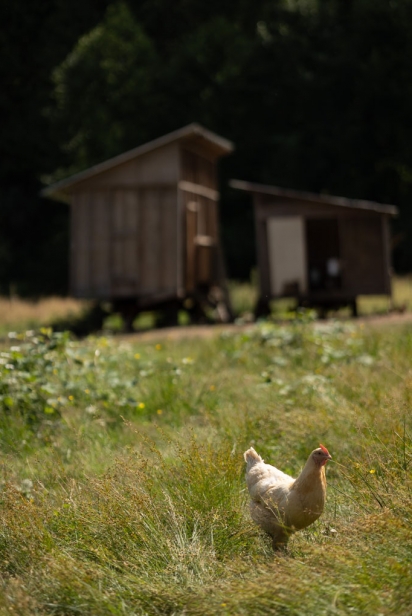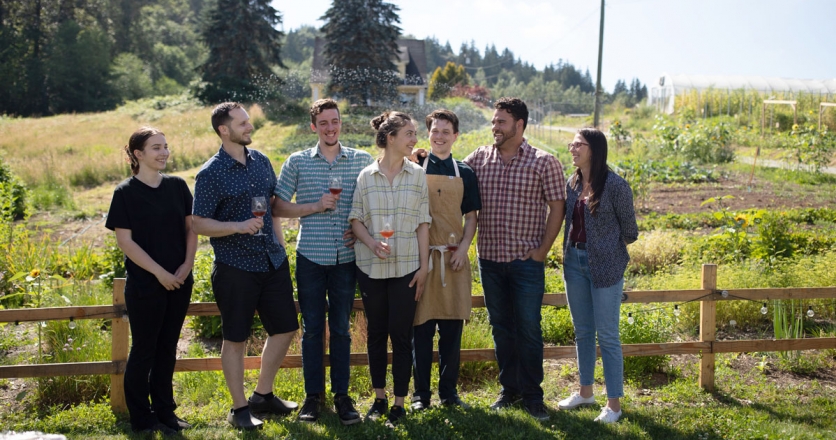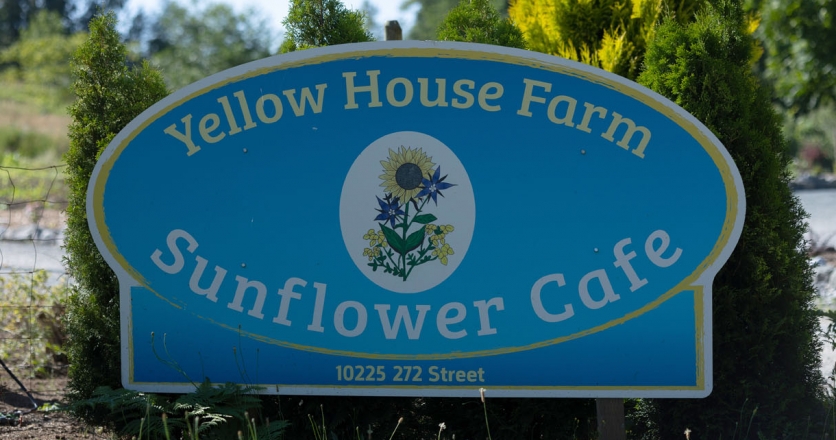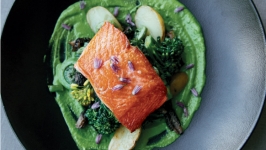Move Over, Sunflower Seeds
Each summer, sunflower festivals from Richmond to Chilliwack attract thousands of visitors eager to get lost in a maze of one-storey-tall yellow blossoms. Chowing down on a sunflower stalk, though, is not generally on the agenda. Co-founder of the Chilliwack Sunflower Festival Kate Onos-Gilbert says the issue in the Fraser Valley is with the climate. Wet weather and high humidity mean the edible parts of the plant usually develop mould before they can be harvested.
“We now just mulch the plants back into the soil,” Onos-Gilbert says.
At Yellow House Farm (YHF) in Maple Ridge, it’s a different story. On the 17-acre property, sunflowers grow alongside kale, cabbage and more than 200 other varieties of assorted produce. They don’t spend a prolonged period in the field exposed to the elements. They’re harvested as quickly as they mature and become part the menu at the farm’s aptly named Sunflower Café.
An edible history
Technically considered an herb, sunflowers (Helianthus annuus) have been cultivated as a food source since before 1000 B.C. Indigenous populations would grind seeds of this plant species, native to North and South America, into flour for cakes.
In the early 16th century, Spanish explorers took sunflower seeds from the Americas back to Europe. The plant quickly became popular for its bright sun-shaped blossoms and flavourful seeds. With a high oil content of more than 45 per cent, sunflower seeds were pressed to extract their oil, and by the early 19th century, they were being grown commercially as an oilseed crop. With high levels of unsaturated fatty acids, the oil is heart healthy, vegan and gluten-free. Its high smoke point also makes it great for frying and cooking.
The bulk of the world’s supply of sunflower oil — 46 per cent — originates in Ukraine, where production has been a mainstay of the country’s economy. As the obvious choice for the country’s national flower, sunflowers became the ultimate of influencers this past spring, as a symbol of support for the Ukrainian people and hope for peace following Russia’s invasion of the country. The dual hashtags — #sunflowersforpeace and #sunflowersforukraine — continue to trend.
In Canada, sunflowers are mass produced for seed and oil, primarily in Manitoba where hot dry prairie summers and low humidity create ideal growing conditions that are in stark contrast to the sogginess of British Columbia’s southern coastal region.
The goodness in soil
From the soil, plants pull nutrients and minerals that feed our bodies. This is especially true of the sunflower whose long tap root digs deep into the ground, soaking up these beneficial bits. The roots are indiscriminate, however, and also attract impurities such as pesticides and fertilizers. It’s the plant’s ability for phytoremediation, the use of living plants to scrub the soil of contaminants, that caused sunflowers to be planted in the surrounding countryside after the Chernobyl and Fukushima nuclear accidents.
At YHF, keeping the soil and all that grows in it kitchen-friendly is top of mind. Gardeners adhere to regenerative agriculture practices, which discourage disturbing the natural structure of the soil and voiding it of essential nutrients. The ground is not heavily tilled and is instead fortified with organic compost. Waste is fed to the farm’s animals and, in turn, the animal waste makes compost. Fertilizers and pesticides that could be absorbed through plant roots are not used on the farm. The produce grown pulls from the ground only what is healthy for both plant and human.
It’s the purity and freshness of the food that excites chef Christopher Janowski when he steps out the door of the farm’s restaurant and harvests what he needs just a few hours before table service. Janowski had been chef de cuisine at Coquille Seafood Restaurant in Vancouver’s Gastown before it closed in 2019. Then came the pandemic and he started spending a lot of time on his friend’s farm in Maple Ridge. The idea of a restaurant on-site with dishes prepared by a professional chef took root. Sunflower Café, now in its second season of operation, isn’t bringing the farm to a restaurant; the restaurant is the farm, Janowski says.
Farm owner Rayne Beveridge, who has a background in opera and is an accomplished choral conductor, pivoted. He felt climate change, monopolization and trade disputes were creating uncertainty in the food industry. At YHF, it’s part of the holistic philosophy to work in sync with the systems Mother Nature has perfected to make resilient and adaptive agriculture practices, incorporate new ideas including an on-site restaurant and growing crops, such as sunflowers — though sunflowers are not typically considered a food source.
Tasting Good
Everything connects at YHF. The farm’s honeybees pollinate the sunflowers that in turn are harvested by Janowski and turned into farm fresh plates for diners. Even the stalk of a mature sunflower is thought of as more than a place holder for the flower head. Janowski removes the marrow inside to create a hummus- like spread. “This way,” he says, “we utilize the whole plant.”
The New York Times once described sunflower shoots as a salad’s secret weapon, with a taste comparable to daikon radish sprouts, but without the spiciness. Sunflower petals are edible garnishes with a bittersweet taste. The flower buds taste a bit like artichokes, and once the bitter green leaves around the bottom of the bud are removed, they can be steamed or boiled and served with butter. All 70 varieties of sunflowers are edible, but the bigger and taller, the richer the flavour.
Although imported organic sunflower seed oil, paste and sunflower butter, along with local hydroponically grown sunflower sprouts, are available at many natural grocers, field- ripened stalks or a bunch of edible Fraser Valley sunflower leaves or petals, are unlikely to hit store shelves anytime soon.
But that’s OK because at YHF and Sunflower Café, there are plenty of bright sunny blossoms to go around. It’s sold as an ingredient in a seasonal CSA subscription box and served as part of a farm fresh gourmet dinner at the café. Notoriously modest about its versatility as an esthetic tourist attraction and a well-rounded edible, YHF is bringing the sunflower back to its origins as a sustainable food source.
Yellow House Farm and Sunflower Café
10225-272 St., Maple Ridge, B.C.
yellowhousefarm.ca | sunflowercafe.ca @yellowhousefarmers | @sunflowercafebc


